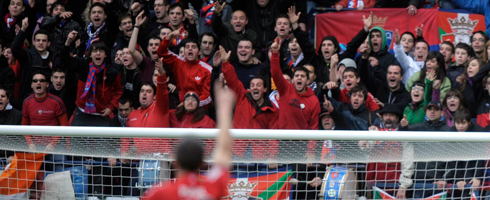Hundreds of thousands are on the streets, marching against bailouts for the banks and austerity packages for them. Rubber bullets fly. As political protest is increasingly criminalised in Spain, unemployment runs at 25 per cent. And while the government claims the country is not heading for a full-scale bailout, families are losing their homes.
The number of evictions in Spain has reached record levels, according to figures released this week. In the first three months of 2012, there were 18,424 evictions between January and March. Some are businesses, but most are homes – couples, families. There is an average of 517 evictions every day, and they say the worst is still to come.
In Navarra, the figure is comparatively low, with just 251 evictions in the first three months of this year. Next to 9,046 in Catalunya, 8,222 in Valencia, or 7,248 in Madrid, it is nothing. But like the rest of the country, the crisis is hitting hard.
In the same three months, the Navarrese government saw its debt rise to €2,725m. Again, it is nowhere near Catalunya’s €42,000m, Valencia’s €20,832m or Madrid’s €16,572m, but it is enough. Desperate to find fresh funds, this week the regional government announced it would pull the €1.4m subsidy to Primera Division side Osasuna.
Osasuna may not be evicted from their stadium as a result, but they may change the ground’s name, and the removal of the government’s support is far from merely cosmetic.
El Sadar has been Osasuna’s home since 1967. In 2005 the club struck a deal with the local government who would ‘subsidise’ the club to the tune of €1.4m per year. In return, El Sadar was renamed Estadio Reyno de Navarra. It was, after all, a top-flight advert for the region.
The decision to cancel the subsidy is bad news for the club President Miguel Archanco, who won club elections just weeks ago. Only 33 per cent of Osasuna’s members turned out to vote – perhaps fans have more pressing matters to deal with than club politics.
But for Archanco the removal of the subsidy is a blow given the state of the club he now oversees. His predecessor, Patxi Izco, cut his final term as President short after 10 years in charge. In February, Izco announced the club’s tax debt stood at €27.9m, but denied having attempted to cut a deal to avoid paying up. He had merely requested a 75-year repayment scheme on the debt – the only viable option open to the club.
Osasuna are not one of Spanish football's big-hitters, even if they only missed out on European football this season by a single point. And according to the economist Jose Maria Gay de Liebana, who specialises in the economics of Spanish football, ‘they are a club with its feet on the ground, and which is run well’.
Yet Osasuna loses €3m a year, while interest on their debt adds an extra €1m to pay. Their annual income is in the region of €28m. In the 2010-11 season, that figure was boosted by the sale of Juanfran to Atletico Madrid and Cesar Azpilicueta to Marseille up to €34m, but according to latest figures available on the club website, the budget for the 2011-12 season was back down to €28m. The loss of the subsidy is a significant one.
Speaking last March, Gay de Liebana pointed to the main challenge for Spanish football – the television rights deal which hurts everyone other than the Big Two. He says a reshuffle of the deal would help clubs like Osasuna out of their debt – Spanish First Division clubs’ combined debt reaches €3.5bn.
While Osasuna have lost their subsidy, the Spanish Football Federation (RFEF) recently opted to stop receiving its €3.3m support. Miguel Cardenal, Spanish Sports Minister, in thanking the RFEF for its decision, said that the national game: “is a mirror for our society. I ask of you responsibility, so that Spanish football sets an example.”
On the back of La Roja’s stunning Euro 2012 victory, the Federation will have little trouble in balancing their €111m 2012 books without any government help.
Yet while the Federation is in a position to renounce its subsidy, and the national team wave the flag high, Spanish club football faces a wave of negative popular opinion. Something has to give. Clubs face a €752m tax bill, not to mention a €600m social security debt. Total debt is well over €3bn, while banks that loan clubs money to sign star players are the same ones requiring a state bailout. The government says it is addressing the situation, forcing clubs to put aside 35 per cent of media rights income as guarantee for its tax commitments as of 2014-15 season.
Meanwhile in Navarra, the crisis may inadvertently bring about the return of El Sadar. As the promotion push for new season ticket sales at Osasuna reads: ‘Futbol changes. Our feeling remains’.

